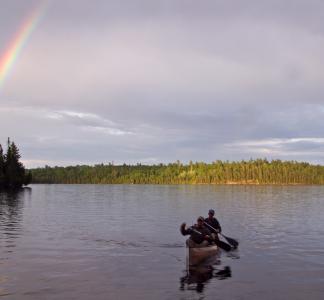Trump admin renews mining leases near Boundary Waters

South Temperance Lake within Boundary Waters Canoe Area Wilderness, Minnesota
briandjan607, flickr
Experts: Copper mining would harm watershed
It’s official: Twin Metals Minnesota, a venture of a multi-billion-dollar Chilean company, will get another shot at mining copper next to one of America’s fragile iconic landscapes.
The Department of the Interior announced May 15 that it is renewing two hardrock mining leases held by Twin Metals in the watershed of the Boundary Waters Canoe Area Wilderness, within Minnesota’s Superior National Forest.
The lease renewal “violates the law, disregards the science, and ignores widespread public opposition to mining in this beloved and vulnerable area”
The Obama administration had halted that renewal in 2016 to protect the area. But the Trump administration has spent two years trying to open the cherished lands and waters to development, and now, after rushing through a flawed assessment of the environmental risks involved, they’re one step closer to fulfilling the decades-old wishes of powerful mining interests.
“The rush to approve mining in the region and unwind science-based decision-making by the previous administration violates the law, disregards the science, and ignores widespread public opposition to mining in this beloved and vulnerable area,” said Alison Flint, director of litigation and agency policy at The Wilderness Society, in a statement.
No way to “contain” contamination
Experts say the process Twin Metals would use to mine copper in Superior National Forest would discharge sulfuric acid and other harmful substances and contaminate the Boundary Waters’ lakes and rivers. Adding to these concerns is the industry’s poor safety record; it would be effectively impossible to guarantee against accidents such as leaks in the lining of planned waste reservoirs.
More: How a key Interior nominee threatens the Boundary Waters
Since the Boundary Waters’ system of pristine lakes and rivers is highly interconnected and has little natural ability to buffer against acid mine drainage, mining in the area is a recipe for permanent and widespread damage. A group of former U.S. Forest Service staffers, including a past Superior National Forest supervisor, recently wrote to President Trump detailing these concerns and explaining that “there is simply no way to contain contamination without sacrificing the wilderness[.]”
Mining here is unpopular, too. Polling has shown that about two-thirds of Minnesotans are against building a mine on the edge of the Boundary Waters, and dozens of businesses and outdoor recreation groups have registered their opposition. Harvard economists have predicted Twin Metals mines would drain jobs and income from the region by damaging outdoor recreation and overall quality of life.
What happens next?
Now it’s time to redouble our efforts. Sometime this year, Twin Metals will likely submit a formal plan for how it intends to mine in Superior National Forest, and the Bureau of Land Management will launch an official process to determine how that development will hurt the environment. After that, there will be an opportunity for the public to weigh in on the mines, and we will work with partners to make absolutely sure our voices are heard loud and clear--we must protect the Boundary Waters.


